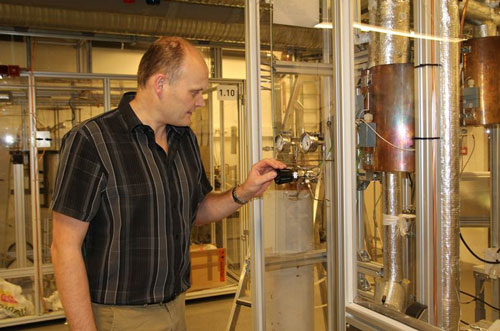May 27, 2012
 |
| Magnus Rønning, a professor in the Department of Chemical Engineering at the Norwegian University of Science and Technology, is head of a new EU funded effort to find metal-free catalysts. |
The EU has awarded 4 million Euros to a new research project that will develop carbon materials to replace precious metals needed in catalysis. The research will help make the production of chemicals and commodities greener, while enabling the European process industry to keep its worldwide competitive edge. The project is called FREECATS - Doped carbon nanostructures as metal-free catalysts. Nine European research institutions and technology enterprises are working on the project, coordinated by the Norwegian University of Science and Technology (NTNU). Professor Magnus Rønning from the Catalysis group at the university's Department of Chemical Engineering is leading the effort, which started on 1 April 2012 and will last for three years.
A more sustainable process industry
Catalysis is one of the major consumers of precious metals, such as platinum. Catalysts affect the speed of chemical reactions, and are frequently used in the process industry. Platinum group metals are not generally found naturally in Europe. Metal-free catalysts that are based on carbon will lead to a significant reduction in the high demand for platinum group metals in Europe.
"Metal-free materials with catalysis properties that are equally as good as precious metals do not exist naturally, so FREECATS is aimed at developing new materials. Using nanotechnology, with atoms as building blocks, we can build carbon structures capable of binding or transforming substances in desired ways," says Magnus Rønning.
Carbon-based catalysis also offers environmental benefits. "Catalysts often contribute to parallel chemical reactions that may compete with the main reaction. Metal-free catalysts have a higher selectivity; they are more reliable in performing the reactions we want. This reduces the risk of reactions creating unwanted waste products that may be harmful to the environment," says Rønning.
Focus on fuel cell technology, olefin production and water purification
FREECATS has chosen to focus on three applications where metal-free catalysts can replace metal-based catalysts: fuel cell technology, the production of light olefins, and water purification.
Catalysts are used in fuel cells to initiate the process by which energy from fuel is converted to electricity in contact with oxygen. The energy produced by fuel cells emits low levels of greenhouse gases, but the method is expensive at present, partly because of costly materials.
Catalysts are used in the production of polyolefin materials to convert propane and ethane to light olefins. The demand for olefins is increasing globally. The existing use of platinum-based catalysts in production is not sustainable, because they are characterized by low selectivity and they are short-lived, costly and polluting.
Organic compounds in water can be oxidized or mineralized into harmless substances by means of catalysis. The method is used to remove bacteria, solvents, chemicals or fertilizers in waste water from industry and agriculture. Metal-free catalysts work just as well for water purification as metal-based catalysts, but they can make the process less expensive.
Source: The Norwegian University of Science and Technology
2 comments:
This is a very great idea. Thank you for this insightful and useful article.
Radiant Barrier
With BullionVault you can purchase physical bullion by the gram at current spot prices.
Your bullion may be stored in one of 5 secure international vaults. And you may exchange it online or take out physical bars.
Post a Comment